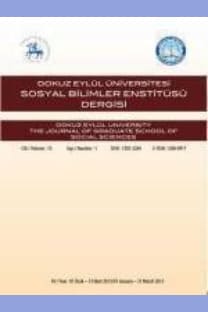Pandemiden İnfodemiye: Bir Covid-19 Facebook Sitesinde Netnografik Bir Analiz
Covid-19 Pandemisi, Infodemi, Komplo Teorileri, Netnografi
FROM PANDEMICS TO INFODEMICS: A NETNOGRAPHIC ANALYSIS ON A COVID-19 FACEBOOK SITE
Covid-19 Pandemic, Infodemic, Conspiracy Theories, Netnography,
___
- Brewer, J. (2000). Ethnography. Buckingham: Open University Press.
- Catalogue of Bias Collaboration. (2017). Catalog of Biases. catalogueofbiases.org: catalogueofbiases.org/biases/popularitybias (accessed on August 09, 2020).
- Cornell Alliance for Science. (2020). COVID: Top 10 current conspiracy theories. allianceforscience.cornell.edu: allianceforscience.cornell.edu/blog/2020/04/covid-top-10-current-conspiracy-theories/ (accessed on August 16, 2020).
- de Gregorio, G., & Radu, R. (2019). Counter-disinformation around the world: Comparing state actions [Conference session]. Global Internet Governance Academic Network Annual Symposium. Berlin.
- Huang, B., & Carley, K. (2020). Disinformation and Misinformation on Twitter during the Novel Coronavirus Outbreak. arXiv:2006.04278v1 [cs.SI] https://arxiv.org/pdf/2006.04278.pdf (accessed on Jun 7, 2020).
- Kahn, J., & McIntosh, K. (2005). History and Recent Advances in Coronavirus Discovery. The Pediatric Infectious Disease Journal, 24(1), 223-227. doi:10.1097/01.inf.0000188166.17324.60
- Kozinets, R. (2010). Netnography: Doing Ethnographic Research Online. London: Sage Publications Ltd. Ortiz-Ospina, E. (2019). The rise of social media. Our World in Data: https://ourworldindata.org/rise-of-social-media (accessed on August 15, 2020).
- Pennycook, G., McPhetres, J., Zhang, Y., Lu, J., & Rand, D. (2020, June 30). Fighting COVID-19 Misinformation on Social Media: Experimental Evidence for a Scalable Accuracy-Nudge Intervention. Psychological Science, 31(7). doi:doi.org/10.1177/0956797620939054
- Radu, R. (2020, July 30). Fighting the ‘Infodemic’: Legal Responses to COVID-19 Disinformation. Social Media + Society, 6(3). doi:https://doi.org/10.1177/2056305120948190
- Vosoughi, S., Roy, D., & Aral, S. (2018). The spread of true and false news online. Science, 359(6380), 1146-1151. doi:10.1126/science.aap9559
- We are Social & Hootsuite. (2020). Digital 2020: Global Digital Overview. Hootsuite. wearesocial.com/blog/2020/01/digital-2020-3-8-billion-people-use-social-media (accessed on August 18, 2020).
- World Health Organization. (2020). 1st WHO Infodemiology Conference. Newsroom: who.int/news-room/events/detail/2020/06/30/default-calendar/1st-who-infodemiology-conference (accessed on August 15, 2020).
- World Health Organization. (2020). Coronavirus disease (COVID-19) advice for the public: Mythbusters. who.int/emergencies/diseases/novel-coronavirus-2019/advice-for-public/myth-busters (accessed on August 16, 2020).
- World Health Organization. (2020). Munich Security Conference. who.int/dg/speeches/detail/munich-security-conference (accessed on August 15, 2020).
- ISSN: 1302-3284
- Yayın Aralığı: Yılda 4 Sayı
- Başlangıç: 1999
- Yayıncı: Dokuz Eylül Üniversitesi Sosyal Bilimler Enstitüsü
SÖZCÜKLERİN SINIFLANDIRILMASINDA KULLANILAN ÖLÇÜTLER ve SINIFLANDIRMAYA HERMENUETİK YAKLAŞIM
HAYAT AĞACI VE CENNETTEN MUCİZELER FİLMLERİNDE ACI ÇEKME TEODİSESİ VE KOZMİK YOLCULUKLAR
YEREL HALKIN TURİZM ALGISI VE TOPLUMSAL YAŞAM KALİTESİ: İĞNEADA ÖRNEĞİ
GELENEKSEL İSLAM ANLAYIŞINDA KADININ ÇALIŞMASI
Huriye TEKİN ÖNÜR, Emine DÜNDAR
Kişilik Özellikleri ve Risk Algısının Motosiklet Kullanım Tarzı ile İlişkisi
Tansu ALAVCI, Gizem GÜMÜŞ, M. Ehil TEKİN, Burcu TEKEŞ, Yeşim ÜZÜMCÜOĞLU
Pandemiden İnfodemiye: Bir Covid-19 Facebook Sitesinde Netnografik Bir Analiz
Çankırı-Ilgaz-Belören Köyü'nde Yaşayan Su Mirası: Çeşme ve Çamaşırhaneler
BİRLEŞMİŞ MİLLETLER İNSAN HAKLARI KOMİTESİ’NİN TEİTİOTA KARARININ ARDINDAN “İKLİM MÜLTECİLERİ”
KİŞİLİK ÖZELLİKLERİ VE RİSK ALGISININ MOTOSİKLET KULLANIM TARZI İLE İLİŞKİSİ
Tansu ALAVCI, Gizem GÜMÜŞ, M. Ehil TEKİN, Burcu TEKEŞ, Yeşim ÜZÜMCÜOĞLU
ÇANKIRI-ILGAZ-BELÖREN KÖYÜ’NDE YAŞAYAN SU MİRASI: ÇEŞME VE ÇAMAŞIRHANELER
